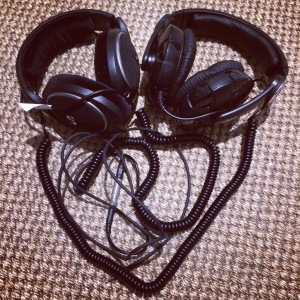I love to dance. I’m a 5Rhythms woman, and blogged about it ages ago (incl a clip in France) HERE. I did 10 years of ballet classes, which I loved, although the best bit was pretending to be a cloud, twirling free around the long sunlit room. I goddamn LOVE Disco, and anything funky sets my feet a’tappin’ and my knees a’bouncin’.
Last week at the Attachment course I’m doing, our teacher said:
“Emotion is the music in the dance of adult intimacy”.
My studious ears pricked up. Ooh, are we gonna dance? We all relish the heart-fluttering sweet ballad of new romance don’t we? Every love song making sense. Or the passionate, sweaty, sexy tango. But who wants to turn up for that surprise ear-bleeding death metal concert by Dispute, Stress and Shove? Not me thanks!
That’s what conflict can be though. One minute you’re chatting over a cup of tea, or pushing your trolley down the aisle (I once dumped a boyfriend at the checkout. On my birthday. *sigh. I was young… But I digress…); the next moment one of you says something ‘wrong’, and that’s it: the music between you flips to a seething soundtrack of drums and wailing electric guitar, roaring backwards down a dark rollercoaster tunnel.
How does it happen?? Who’s in charge of the music for god’s sake? Well of course, no one is. Not straight away. Once triggered, our brains and nervous systems literally flood us with Fight/Flight/Freeze chemicals, while our lower limbic system takes over our rational, patient, meditation-favouring prefrontal cortex/more evolved brain parts.
What can we do? Stop. Breathe. Breathe in for 4, and out for 8. Tune in and take note. Feel your feet on the floor, your hands on your legs, your place in the room. Come back to Here and Now. Relax your eyes and tongue. Run warm water over your hands, or touch your lips. According to the latest research into brain plasticity, neuroscience, and our nervous systems, all these measures can soothe anger, anxiety, and enflamed emotional reactions. A 20 second hug can also relax the body, and stimulate the release of Oxytocin (known as ‘the love hormone’), for bonding and closeness.
It generally takes women 8 minutes to calm the production of stress chemicals in the body after conflict, and 20 mins altogether to come back to ‘normal’; men take a little longer. This means that the terrible music slowly gets turned down, then off altogether (with apologies to death metal fans out there- perhaps for you it’s opera, or even [*gasp] Disco?). But no one can talk kindly or lovingly when bad music is blasting. So take note of your inner DJ, and the sound battle going on between you and your partner.
“When we are no longer just reacting on automatic, we can choose how we navigate and experience our world.”

I agree its far better to respond, than to react. Deep breaths and walking out the room usually helps with finding a better way to respond. I like the idea of a hug to trigger the ‘love hormone’ but its usually the last thing I want after an inappropriate reaction of some sort. Lots to think about here
LikeLiked by 1 person
Yes indeed; the teacher did say the exact same thing re not being able to hug/be hugged! It is helping me to remember that deep down, I probably do NEED a hug though… and likewise for the other person, whoever it may be. We all just want to be securely Loved don’t we? Thanks for reading ❤️
LikeLiked by 1 person
Yes we do. I will go visit your 5 rhythms post now, I was always intrigued by this group dance but never had the courage to try it ❤️
LikeLiked by 1 person
It’s an awesome practise! Like a moving meditation. I’ve ben doing it on and off for 20 years… more on now… Love it 🙂
LikeLiked by 1 person
A friend of mine once told me that a lot of the work we do in a relationship is mental, being in the mood, being pissed off, making up, whatever, it doesn’t just happen—it takes our minds. Forgiving myself for the need to use my head to get there (wherever there may be) changed things so much for me. This made a lot of sense.
LikeLiked by 1 person
I’m glad it resonated for you; I’m finding all the body-based research fascinating. There will be more to come. Thanks for reading and commenting, G
LikeLike
And, have you seen this? It’s fabulous. https://www.brainpickings.org/2013/07/02/adrienne-rich-honorable-human-relationship/
brainpickings is *fabulous*
LikeLiked by 1 person
Oh Thanks so much! I’m so going to read and respond, excellent.
LikeLike